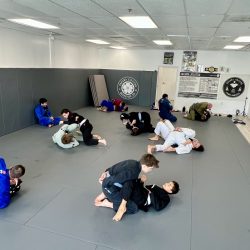
Jiu Jitsu isn’t just about learning how to defend yourself; it’s a journey of self-discovery, discipline, and personal growth. While the path of Jiu Jitsu can be challenging, it’s also gratifying, and that’s why so many people fall in love with it.
The Effectiveness of Jiu Jitsu
Jiu Jitsu is often called “the gentle art,” but don’t let the name fool you. It’s one of the most effective martial arts for self-defense, and its techniques are designed to allow a smaller person to defend themselves against a larger, stronger opponent. This is achieved through leverage, technique, and strategy rather than brute strength. (This is why so many women are drawn to Jiu Jitsu!)
The real beauty of Jiu Jitsu lies in its adaptability. Jiu Jitsu offers many options, Whether standing or on the ground, in a defensive position or on the attack. It teaches you how to stay calm under pressure, use your opponent’s force against them, and find a way out of seemingly impossible situations. This effectiveness in real-world scenarios makes Jiu Jitsu so influential and respected among martial artists.
The Hard Road to Mastery
With all of that said, training in Jiu Jitsu is hard.
There’s no sugar-coating it. It demands dedication, patience, and a willingness to step outside your comfort zone. The learning curve is steep, and progress can sometimes feel slow, especially in the beginning. You will sweat, struggle, and ‘tap out ‘more times than you can count. (In Jiu Jitsu, ‘tapping out’ is a way to signal that you’re in a position where you could be injured, and it’s a way to end the match safely. I tell my students to tap early and tap often!) It’s all part of the process.
But the challenges in Jiu Jitsu aren’t just physical—they’re mental too.
You must learn to think strategically, anticipate your opponent’s moves, and stay calm under pressure. You will face frustration when a technique doesn’t stick in your brain right away or when you’re stuck in an uncomfortable position during sparring. But it’s these very challenges that make Jiu Jitsu so effective. Every time you overcome a hurdle, you’re not just getting better at Jiu Jitsu—you’re becoming a stronger, more resilient person. These mental challenges also improve your problem-solving skills and your ability to stay calm under pressure pretty much anywhere.
Why People Love Training
The biggest question about Jiu Jitsu we hear most often: Why do people love it despite (or perhaps because of) its difficulty? For many, it’s the sense of accomplishment that comes with mastering a new technique or surviving a tough sparring session. Jiu-Jitsu is a journey with no end—there’s always something new to learn and always a way to improve. This continuous growth keeps people motivated and engaged, empowering them with a sense of achievement.
Another reason people are drawn to Jiu Jitsu is the sense of community they feel when finding the right place to train. At Sakura and many other academies, students are more than just training partners. The bonds you form on the mat are strong, built on mutual respect and shared experiences. Training together creates a deep sense of camaraderie that extends beyond the dojo.
Finally, Jiu Jitsu offers a unique form of stress relief. When you’re on the mat, you’re fully in the moment, focused on the task at hand. The stresses of daily life fade away as you immerse yourself in the flow of training. This mental escape, coupled with the physical workout, leaves you feeling refreshed and ready to take on life’s challenges.
Training in Jiu Jitsu may be challenging, but the rewards are worth every drop of sweat. Whether you’re looking to learn self-defense, get in shape, or take up a new hobby, Jiu Jitsu has something to offer everyone. It’s a journey of self-discovery, discipline, and personal growth that can inspire and motivate you to become the best version of yourself.
